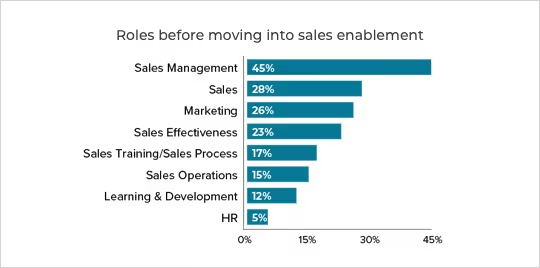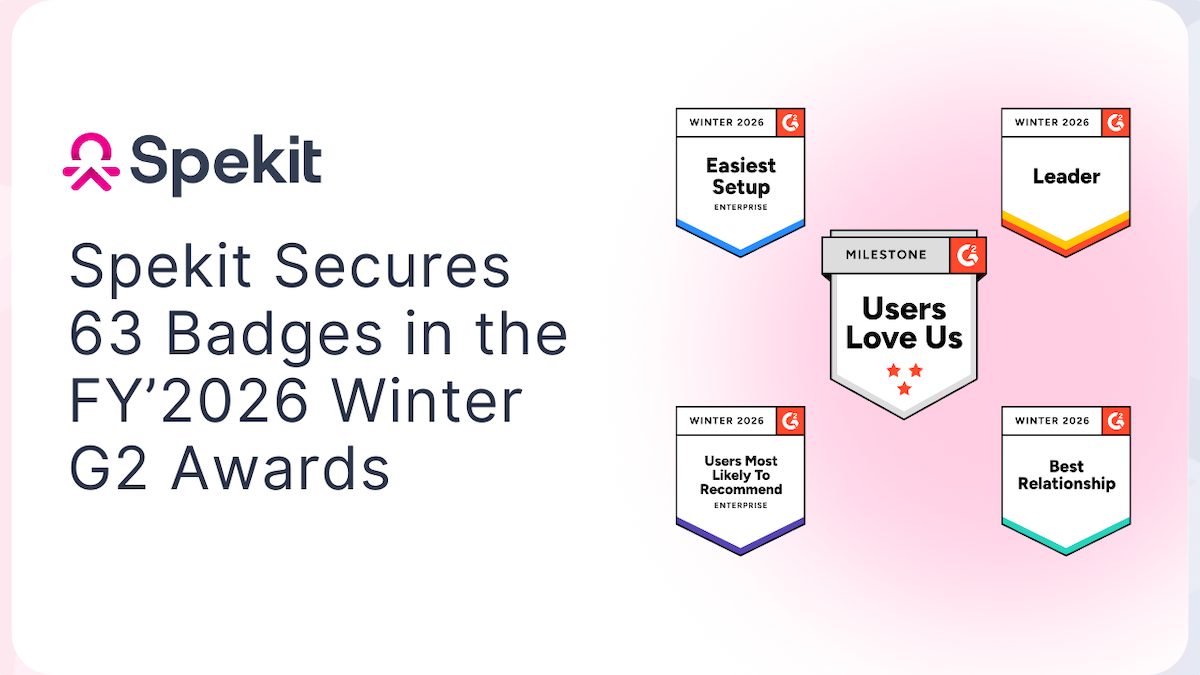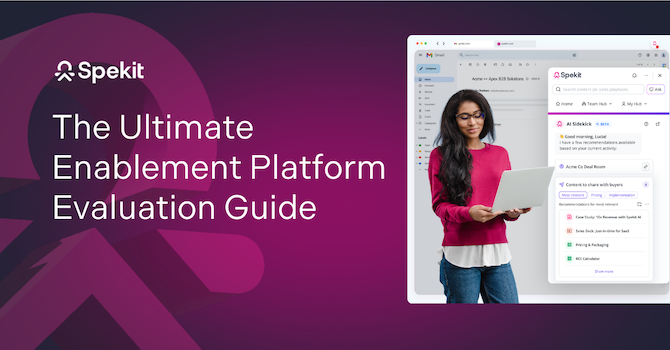Sales enablement has become a must-have in driving go-to-market success. Back in the day (okay, in 2013), only 19% of companies had a dedicated sales enablement person, program, or function. Now? There’s been a jaw-dropping 343% increase in businesses adopting sales enablement in the last five years alone.
Job boards are showing a similar surge. In 2023, “sales enablement specialist” was the sixth fastest-growing job title on LinkedIn. There couldn’t be a better time to start a sales enablement career, but what’s the best way to break in?
If you’re wondering how to get into sales enablement, and the sales enablement best practices that will help you thrive, you’ve come to the right place. Let’s explore everything you need to know about building a successful sales enablement career.
What is a sales enablement career path?
There’s no single degree or linear ladder. High-performers tend to share three traits: a genuine interest in how revenue work happens, experience you can translate from sales/marketing/CS/L&D, and an eye for systems and processes like building (sales pipeline stages) that turn knowledge into execution.
Signals you’ll enjoy this path: you like helping others win, you’re comfortable with metrics, and you’re curious about the psychology of how people learn in the flow of work. Curious about what it takes to build out an effective sales enablement strategy.
Why now: Most companies invest in enablement programs today, and the function is expanding, not shrinking, even as tools consolidate.
Common Sales Enablement titles
Sales enablement job titles and responsibilities exist on a sliding scale and depend on factors like company size and stakeholder priorities. The most common sales enablement titles you’ll come across on your job hunt include:
Sales Enablement Coordinator
In an entry-level role, sales enablement coordinators keep sales enablement strategies running smoothly. Coordinators take care of things like administrative tasks, sales enablement training and onboarding logistics, and sales content library updates.
Sales Enablement Specialist
Sales enablement specialists focus on creating and executing specific enablement strategies to better support the sales team. Responsibilities include delivering training to reps, managing sales enablement software and tools, and making sure sales materials are top-notch.
Sales Enablement Manager
A sales enablement manager typically involves an in-depth understanding of the sales process and the tools used to support it, such as CRMs and sales intelligence software. This is so management can effectively support the sales team and make sure they always have the resources they need to be productive.
Director of Sales Enablement
This leadership position usually focuses on leading a specific area within the broader sales enablement strategy, such as content management or sales training. Sales enablement directors ensure their company's sales team is equipped, informed, and motivated to meet their targets.
VP of Sales Enablement
The VP of sales enablement is responsible for the overall success and direction of the sales enablement program.
Their focus? Making sure enablement processes contribute to the company’s revenue objectives, tracking progress, and adapting strategies based on incoming data, among other responsibilities.
Chief Sales Enablement Officer
This is the highest sales enablement position within a company. Chief sales enablement officers oversee and shape the company’s entire go-to-market strategy.
Top-tier responsibilities include connecting enablement strategies to business outcomes, advocating for enablement resources and budgets at the executive level, and ensuring the approach is unified between departments.
Job market snapshot: “Sales Enablement Specialist” ranked among LinkedIn’s fastest-growing sales job titles and remains widely posted in 2025.
Benefits of a career in Sales Enablement
There are plenty of perks that come with a sales enablement career. At a high-level, you'll find:
- Impact at scale: You multiply seller performance with better onboarding, content, and coaching.
- Range, not monotony: Content, change management, training, analytics, tooling.
- Cross-industry mobility: Healthcare, SaaS, finance, public sector.
- Clear advancement: Manager → Director → VP → Chief.
- Proof of value: Orgs using just-in-time enablement materially outperform peers.
Reality check: Content decay and low rep adoption are still common. Pros who simplify workflows, increase in-app access, and kill stale content create outsized value.

Sales enablement specialists are in high demand
As of 2023, 90% of organizations have a dedicated sales enablement team or program, up from 75% in 2022. Companies continue to increase their budgets for both enablement and the talent needed to do the job.
With 84% of executive leaders planning to commit to the same levels of investment or increase their budgets for sales enablement in the next year, there couldn’t be a better time to launch a sales enablement career.
Career growth opportunities are endless
Now that companies have gotten the memo on the importance of sales enablement, it’s become a career path with endless growth opportunities. As you shape the company's overall direction and influence its revenue potential, you automatically do the same for your career, and those of your entire team.
Sales enablement is the opposite of monotonous
A sales enablement specialist's primary responsibilities cover various tasks, all aimed at helping sales teams perform their best. You’ll get to flex your muscles with many different skill sets, including:
- Creating onboarding programs
- Developing sales enablement content
- Managing sales enablement tools
- Monitoring sales enablement metrics
- Fine-tuning sales processes
- Providing coaching and support to reps
There are several specialties to choose from
As you navigate the day-to-day of your sales enablement career, you might find a certain area of revenue enablement that you shine in and want to make your specialty.
Fortunately for you, there are plenty of specialization opportunities on the table, including:
- Training specialist: Design and deliver training programs to level up your team’s knowledge and skills.
- Content developer: Create and curate top-notch sales collateral that aligns with company goals.
- Sales enablement analyst: Track sales performance, conduct market research, and generate reports for sales leaders.
- Tech administrator: Manage and optimize sales enablement tools and platforms.
- Sales enablement operations manager: Work with sales enablement teams to streamline and optimize the entire sales process.
- Cross-functional collaboration manager: Act as the bridge between internal teams and departments to ensure alignment with each other.
Sales enablement is a meaningful career path
Every sector is on the hunt for the best sales enablement specialists. This means you can further elevate how fulfilling your sales enablement career is by working for companies that also align with your personal values and interests, such as healthcare, nonprofits, or advocacy.
How to start your Sales Enablement career
Ready to make it official and launch your sales enablement career? Here’s where to start, and how to thrive, as a sales enablement specialist.
1. Pre-sales education
A degree isn’t always necessary to build a successful sales enablement career. But if you want to climb the ladder into management and beyond, a bachelor’s degree is typically a requirement.
The following degree programs are considered some of the best precursors to a career in sales:
- Business
- Marketing
- Finance
- Economics
- Management
- Psychology
- Communications
- Public Relations
Don’t underestimate the power of certifications, either, which show that you’re a self-starter who’s committed to being a lifelong learner. Some to consider:
- Spekit’s Scaling Sales Course
- Sales Enablement Collective’s Sales Enablement Core Certification
- HubSpot Academy’s Sales Enablement Certification
- Sales Enablement Pro’s Sales Enablement Certification
- Project Management Institute’s Project Management Professional Certification

Take note of any non-enablement job experience and skills that could be applied to sales enablement. Maybe you’ve spent time in retail or customer service spaces or worked in offices where the tech stack paralleled those used in sales pipelines.
Angle everything on your resume from the vantage point of how you’d apply it to a sales enablement career.
2. Early career experience
Roughly two-thirds of sales enablement pros have a background in some sort of sales role, while others made the transition from marketing, learning and development, and human resources.
Start by seeking out entry-level roles, like sales assistant or sales rep positions, to gain foundational experience in the industry. Think: generating and qualifying leads, relationship-building, problem-solving, joining in on client calls, that sort of thing.
From there, you can move up the ladder to account executive, where you’ll get to manage your own roster of prospects and customers, conduct sales calls, host demos, and close deals.
At this point in your sales enablement career journey, it can be helpful to start scanning entry-level sales enablement gigs for intel on the skills and qualifications required so you can start stacking the deck in your favor.
3. Transition to sales enablement
Ready to get your foot in the door? A great step is landing a sales enablement associate or coordinator role. Here, you’ll learn the ropes of running a sales enablement program by helping teams stay organized and processes running smoothly.
Your day-to-day will include some combination of optimizing sales processes, facilitating onboarding and training, putting new tech solutions into motion, and acting as a bridge between marketing and sales to keep teams in alignment.
The next step up the ladder is becoming a sales enablement specialist, where you go from supporting programs to running them—taking on more significant responsibilities, such as strategy creation and development, training program design, and sales process improvements.
4. Building sales enablement skills
The more diverse your skill set, the more fulfilling and lucrative your sales enablement career could be. Add these essential hard and soft skills to your repertoire, either on-the-job or through additional courses, workshops, and coaching.
- Analytical thinking: Analyze sales data, spot patterns, and use them to drive strategy development.
- Communication: Offer super-clear verbal and written communication to effectively train, update, and offer feedback to revenue-centric teams and other stakeholders.
- Content creation: Develop top-notch sales content that delivers results.
- In-depth knowledge: Use deep knowledge of the end-to-end sales process and how reps operate and behave to create the most effective program possible.
- Onboarding and training: Create and deliver training that accelerates ramp time and shortens sales cycles.
- Project and time management: Handle multiple strategies at different levels of completion and deliver results on time.
- Adaptability and continuous learning: Flow with constantly evolving sales strategies and stay on top of relevant industry changes and trends.
- Technical proficiency: Build an advanced familiarity of go-to sales enablement software, like CRM and content management systems, collaboration platforms, and analytics and reporting tools.
New in 2025: AI skills that move your career forward
Hiring teams now expect enablement pros to use AI, govern it, and prove its impact.
Must-have skills
- Contextual AI for sellers
- Configure AI assistants like Spekit Sidekick to surface content and coaching in the flow of work based on signals from email, CRM, call notes, and deal stages.
- RAG-aware content systems
- Structure and label content so retrieval-augmented generation can find the “one right thing” at the right time. Tagging alone won’t cut it; quality, freshness, and structure matter.
- Data hygiene for AI
- Clean CRM/process data → better recommendations → better outcomes. If there’s one argument for pipeline hygiene, it’s content accuracy.
- Change enablement with AI
- Use just-in-time enablement to inform reps of changes at the exact moment and location of need, not in a weekly blast.
- Outcome analytics
- Tie content and enablement touchpoints to pipeline and revenue insights, not just completion metrics.
Why this matters: Teams using AI are far more likely to report revenue growth; AI adoption across functions climbed sharply through 2024–2025.
5. Growing your sales enablement career
The beauty of a sales enablement career is the power to create your own path for professional growth.
What’s next for you? Sales enablement manager? Director of sales enablement? VP? Study job listings for the next rung of your career ladder, what the day-to-day involves, experience required, skills needed, and map out exactly how to step up your game to snag that promotion later.
Compile a portfolio highlighting your sales enablement projects, such as training programs and sales playbooks you’ve developed. Most importantly, show off any metrics that show how impactful your work has been on sales performance and revenue goals.
Then, based on the next steps you want to take in your sales enablement career, identify who would be best to nurture relationships with. Maybe co-workers on a similar career trajectory, potential mentors you’d like to learn from, even HR to see what opportunities there are for professional development within the company.
Building the right portfolio (what to show)
- A “just-in-time” micro-curriculum you shipped (e.g., playlists for new AEs moving from Discovery → Demo) with before/after metrics.
- A content refresh plan that cut decay and reduced time-to-asset for reps.
- An AI assistant demo that recommends deal-specific content and drafts personalized follow-ups based on call notes.
- A data hygiene initiative that improved forecast accuracy or lowered time to first meeting.
How to grow into leadership
Study job descriptions one level up, then work backward: which gaps can you close in 90 days? Build a quarterly plan with one shipping goal in each area: content quality, coaching, tooling, analytics, change.
Interview the company, too. Ask:
- How do reps access content inside their workflow?
- What percent of the library is >6 months old?
- What AI is live today and where is it embedded?
- Which enablement signals leadership reviews monthly?
Land your dream sales enablement role
The function has tripled in a decade and is still expanding. Pair people skills with AI fluency, work backwards from revenue outcomes, and show how you’ll simplify the day-to-day for sellers.
Want a deeper dive?
- Read Just-in-Time: The Future of Enablement in a World of AI for a practical model of contextual, personalized, simple enablement in the flow of work.
- Grab The Impact of Enablement 2025 Report for current data on adoption, content decay, and what separates top programs.







